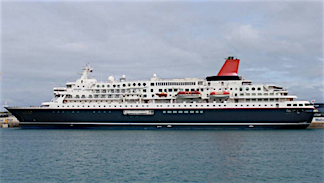The following is text of a news release from the National Transportation Safety Board (NTSB):
(WASHINGTON) — At 2113 local time on Dec. 30, 2018, the stern of the passenger vessel Nippon Maru struck mooring dolphins at a U.S. Navy fueling wharf in Apra Harbor, Guam, while the vessel was maneuvering in a turning basin after getting underway from the harbor’s commercial port. No pollution or injuries were reported. Damage to the vessel was estimated at $456,080; damage to the mooring dolphins was in excess of $500,000.
Probable cause
The National Transportation Safety Board determines that the probable cause of the passenger vessel Nippon Maru’s contact with the mooring dolphins at the U.S. Navy wharf D in Apra Harbor, Guam, was alcohol impairment of the master while he conned the vessel, resulting in an errant astern engine input.
Click here to read the complete report.
Report excerpt
The ability to effectively challenge the actions of another bridge watch stander when an unsafe condition exists — also an essential element of BRM (bridge resource management) — is more difficult when there is a large gap between levels of authority in bridge watch team members. This gap, known as “power distance,” can lead senior personnel to disregard valid challenges by junior personnel. Prior to Nippon Maru striking the mooring dolphins, the third officer warned the master three times that he had the joystick in the wrong position, yet the master ignored each of these warnings and kept the joystick astern. When the third officer attempted to take physical control of the joystick and moved it ahead, the master rebuffed him and moved the joystick back astern. The third officer was the most junior deck officer on the ship, with only a fraction of the master’s seagoing experience. Additionally, he stated that his relationship with the master was poor, and the master refused to be briefed by the third officer prior to getting under way. It is possible that a large power distance between the master and the third officer, exacerbated by the master’s alcohol-impaired state, contributed to the master’s failure to heed the third officer’s warnings.

